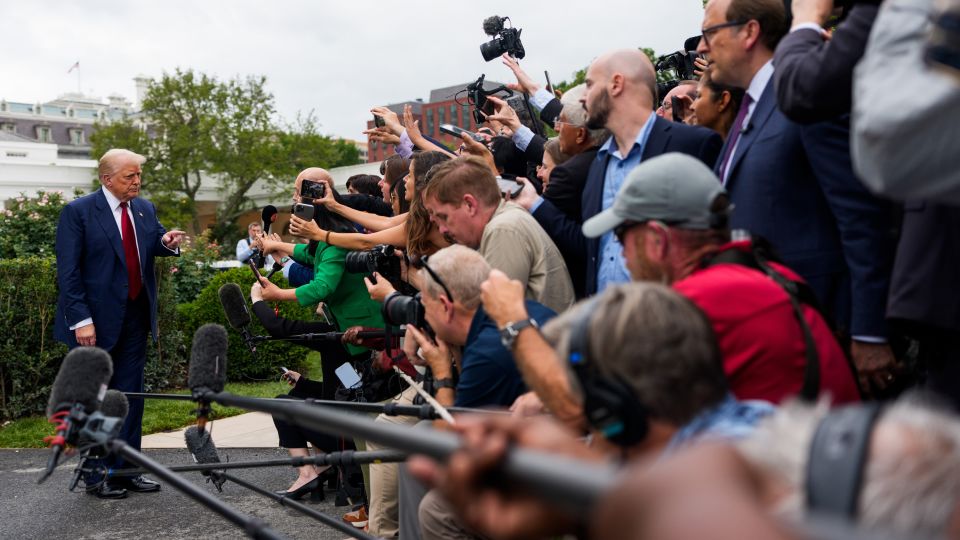Early in President Donald Trump’s second term, plenty of ink was spilled on the question of whether his 2024 voters regretted their votes. The verdict – including my own – was generally that this theory was overblown.
There were anecdotes, yes, but it didn’t seem to be an especially measurable phenomenon.
More than six months in, that could be changing, at least somewhat.
It’s probably still too simple to say that lots of Trump supporters regret their votes. But to appropriate a phrase you might have heard from your parents once upon a time: Many Trump voters aren’t mad (or fully regretful); they’re just disappointed.
A new poll from the University of Massachusetts Amherst is one of the best gauges of this to date.
It found just 69% of 2024 Trump voters agreed that they are “very confident that I made the right choice.”
That’s fewer than the 78% of Kamala Harris voters who said the same of her. It’s also down slightly from the 74% of Trump voters who said they were very confident in their vote back in April.
That doesn’t mean the other 31% of Trump voters are full of regret. Indeed, most of them (19% of the total) said they’re still “confident” in their votes but that they had “some concerns.”
But about 1 in 10 Trump voters said either that they regretted their votes to some degree, had “mixed feelings,” or wish they hadn’t voted. That group has grown slightly since April.
And all told, 14% of Trump voters said if they could redo their 2024 votes, they would either vote for Harris (6%), vote third-party (5%) or not vote at all (3%). That’s more than the 8% of Harris votes who would have picked a different option than their candidate.
It’s just one poll, but the numbers do make sense in context. And other data gestures in this direction, too.
Since many of those stories were written earlier this year, Trump’s popularity has continued to wane – to the point where he now owns the worst early first-term and second-term approval ratings in modern history, according to Gallup.
And recently, Trump and his administration have taken a number of actions that seemed to test the tolerance of even his most devoted supporters.
That includes his military strikes on Iran (which many influential MAGA types initially balked at), his increasing support for arming Ukraine (which polls suggest Republicans have opposed nearly 2-to-1) and passing a historically unpopular agenda bill featuring Medicaid cuts (a bill that CNN polling showed only 30% of Republicans strongly supported).
Many Republicans have also questioned Trump’s tariff policies and said he’s not focused enough on inflation.
But perhaps Trump’s most problematic episode with his base is his administration’s ongoing Epstein files fiasco.
The UMass poll shows just 38% of Trump voters said the administration has handled the situation well, and 33% say it’s hiding information. That’s 1 in 3 Trump voters who think there’s a cover-up, to some degree. These numbers echo other data that suggest this is by far Trump’s worst issue with his base.
All of it has combined to lead some prominent influencers who had supported Trump to distance themselves from him.
In other words, there’s increasingly plenty for his supporters to dislike, depending upon what’s important to them. His approval ratings on a series of issues include small but significant GOP defections. Last month I called it a “looming malaise.”
And the idea that a small but significant number of Trump voters are at least having second thoughts about their votes tracks with other data.
Multiple polls, for instance, have shown an especially sharp drop in Trump’s approval among young adults. A recent CBS News-YouGov poll showed adults under 30 have gone from 55% approving of Trump in February to 28% last month.
CBS data last month also showed 16% of Republicans said Trump is doing different things than he promised on the campaign trail – which could certainly signify discontent.
And finally is a Yahoo News-YouGov poll last month. Rather than ask about personal voter regret, it asked people whether they knew other people who regretted their votes. It found 17% of Trump voters said they knew a regretful fellow Trump voter. (That was double the 8% of Harris voters who said they knew a regretful Harris voter.)
Why is that significant? Well, for one, it suggests there are enough publicly regretful Trump voters that nearly 1 in 5 Trump voters have at least encountered one.
But more than that, it might actually be a better measure of voter regret than straight-up asking people about their own views.
People, after all, don’t love the idea of admitting they personally made a mistake. Some political scientists believe questions like this are better at unearthing hidden trends, because they allow people to hint at their own views while keeping the sentiment at arm’s length. “I don’t regret my vote, but I know people who do,” might suggest the person in question has some qualms of their own.
Whatever the case, it’s certainly something worth watching right now. There’s plenty of reason to believe Trump voters could be somewhat more disillusioned about their votes than they were a few months ago. And the data suggest that might indeed be the case.
For more CNN news and newsletters create an account at CNN.com

